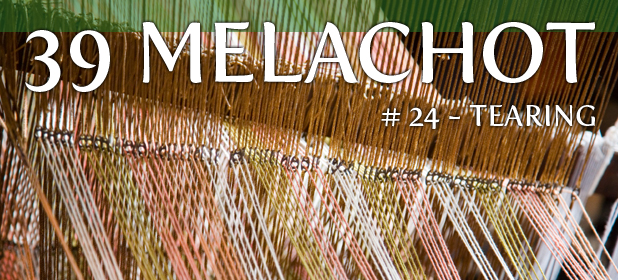As mentioned in the previous melacha, the Mishkan was draped with coverings composed of several panels sewn together. Repairing these coverings required tearing the damaged area so that it might be corrected and re-sewn. This melacha, called korei’ah, is the reciprocal of tofeir, the act of sewing.
It’s important to note that this tearing was done for the purpose of repair; all the melachos are constructive in nature. Accordingly, any tearing or ripping for a constructive reason is considered korei’ah at the Biblical level. An example of constructive tearing is opening an envelope, which not only allows access to the contents but also turns the envelope itself into a useful place to store the letter. (Purely destructive tearing is prohibited at the Rabbinic level.)
Korei’ah only applies to pliable substances, not to firm material like wood. (That’s not to say that breaking hard objects is necessarily permitted on Shabbos, just that it’s not korei’ah.) It also does not apply to food, so one may tear off hunks of bread.
Korei’ah is extremely relevant when it comes to opening food packages on Shabbos. There’s a wide variety of opinions and the details can vary depending on the type of packaging involved, so a person should consult with his or her halachic advisor for guidance in this area.
This is just an introduction to the concepts of the melacha of korei’ah; it is not a substitute for a full study of the halachos.
